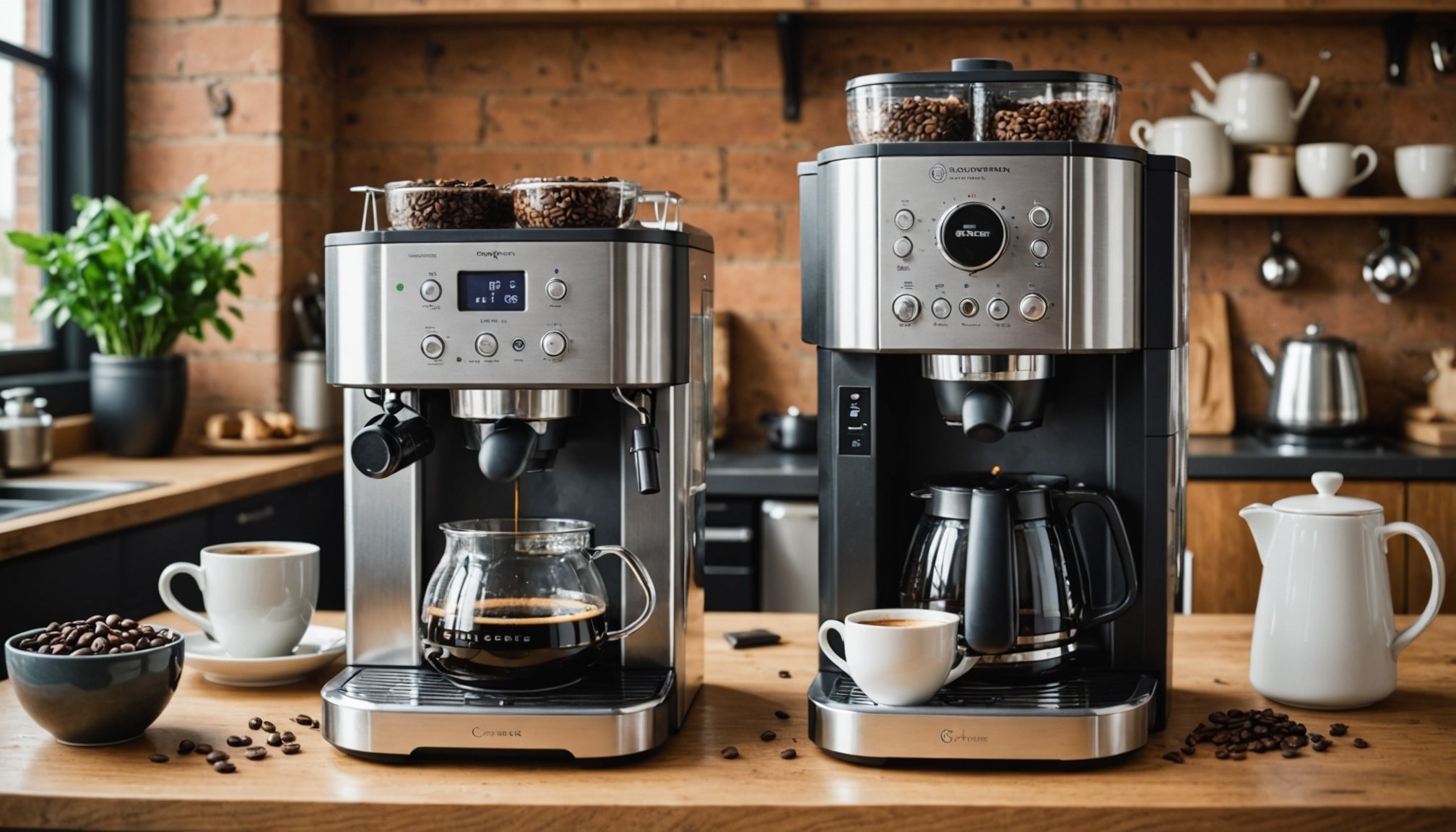Understanding Sustainable Coffee Makers
As the global demand for coffee continues to rise, the importance of sustainability in coffee production cannot be overstated. Sustainability in this context encompasses not only the processes behind coffee harvesting but also the tools used to brew our favorite beverage. Eco-friendly coffee machines play a critical role in reducing the environmental impact associated with conventional coffee production. These devices are designed to minimize resource consumption and waste.
There are several types of sustainable coffee makers, each offering unique advantages. Traditional drip machines with energy-saving features reduce electricity usage, while manual brewers like French presses and pour-overs eliminate the need for filters. Pod-based options have also started introducing compostable or recyclable pods, lessening their eco-footprint.
Have you seen this : The Definitive UK Homeowner’s Handbook: Choosing the Perfect Kitchen Shelving Units
Choosing eco-friendly options yields several key environmental benefits. Primarily, these machines help reduce waste, especially when crafted from sustainable materials such as stainless steel or BPA-free plastics. By prioritising energy efficiency, these appliances lessen household carbon footprints. Furthermore, manufacturers often focus on creating durable products, decreasing the need for frequent replacements. Opting for sustainable coffee makers is not just a choice for better coffee; it’s a commitment to a healthier planet.
Features to Consider in Sustainable Coffee Makers
When examining coffee maker features, prioritising sustainable materials is key to minimising environmental impact. Sustainable materials often include durable stainless steel or BPA-free plastics, which not only decrease waste but also promote long-term usage. Embracing such materials reduces the necessity for frequent replacements, contributing to a greener lifestyle.
In the same genre : Your comprehensive handbook for choosing durable kitchen tiles perfect for the uk weather
Energy efficiency stands as a crucial factor in determining the sustainability of a coffee maker. Makers with high energy efficiency ratings significantly lower electricity consumption, thus reducing the overall carbon footprint of households. Often, these machines incorporate energy-saving modes or automatic shut-off features, making them an environmentally responsible choice.
Beyond materials and energy ratings, additional sustainability features enhance the eco-friendliness of these appliances. Look for coffee makers with reusable filters, as they eliminate the disposable waste that paper filters create. Furthermore, machines offering the option of compostable coffee pods bolster eco-friendly practices by facilitating better waste management.
In choosing these features, consumers can actively support sustainable living. By opting for coffee makers designed with sustainability in mind, it becomes feasible to enjoy a beloved beverage while lessening harm to the planet.
Comparison of Eco-Friendly Coffee Makers
Navigating the world of eco-friendly coffee maker comparison can be daunting with numerous choices available. Several sustainable brands focus on reducing environmental impact without compromising on quality or functionality. Choosing the best brands involves consideration of sustainability practices and product longevity.
Best Brands for Sustainable Coffee Makers
Several brands are leading the charge in creating sustainable coffee makers. These brands, such as Technivorm and Breville, are renowned for using sustainable materials and ensuring their products have minimal environmental footprints. Their commitment to eco-friendly manufacturing methods speaks volumes about their role in promoting green living.
Top Features of Leading Models
Features like energy efficiency and reusable filter designs distinguish top models. Machines with energy-saving modes significantly cut electricity use, aligning with greener practices. Durable components ensure lasting usage, reducing the frequency of replacements and waste generation.
Price Points and Model Variations
Price points for eco-friendly coffee makers vary widely, providing options for different budgets. While some basic models cater to those conscious of price, high-end models offer advanced features, advocating for both sustainability and quality. Exploring diverse model variations allows consumers to make informed decisions based on their needs and environmental commitments.
Green Living Tips for Coffee Lovers
Embracing green living as a coffee lover goes beyond choosing an eco-friendly machine. Integrating sustainable coffee practices into daily routines can significantly enhance environmental benefits. Begin by considering your coffee purchasing habits. Opt for organic and fair-trade coffee, which supports ethical sourcing and reduces the carbon footprint associated with coffee production.
Incorporating small yet impactful changes can further support sustainability. Implement proper recycling and disposal practices for coffee makers and accessories. For instance, compost the coffee grounds, which enrich soils and improve plant growth. Reuse or recycle any packaging materials, minimising waste. Moreover, when it’s necessary to dispose of old machines, locate e-waste recycling programs designed for electronics.
Tips for Reducing Waste in Coffee Consumption
- Measure Your Portions: Brewing only what you intend to consume reduces waste.
- Utilise Reusable Cups: Replace single-use cups with a durable, reusable alternative to cut down on disposable waste.
- Avoid Throwaway Filters: Opt for washable, reusable coffee filters.
By adopting these habits, coffee enthusiasts can indulge in their beloved beverage while actively participating in sustainable living. Taking ownership of these daily practices fosters a more environmentally responsible community, underscoring the importance of individual action in the fight against climate change.
Thrifting and Maintenance for Longevity
Exploring the world of thrifted coffee makers offers environmentally and financially savvy options. Acquiring a second-hand sustainable coffee machine not only conserves resources by giving new life to well-functioning appliances but also cuts costs significantly. This approach supports the circular economy, reducing the demand for new production and its associated environmental impact.
To maximise the lifespan and efficiency of your coffee maker, implementing specific maintenance tips is key. Regular cleaning prevents the buildup of limescale and coffee residue, which can impair machine performance. Utilise a mixture of vinegar and water for descaling, ensuring thorough rinsing afterwards. This simple step enhances both taste and machine longevity, reducing the need for replacements.
Cost-saving benefits extend beyond initial thrift purchases to proper maintenance practices. By maintaining a machine diligently, owners often delay the expense of buying new, eco-friendly ones. This approach aligns with a sustainable lifestyle, fostering both financial prudence and environmental consciousness. Investing time in caring for your coffee maker serves a dual purpose: preserving the quality of your daily brew while contributing positively to the planet. Embracing these measures reflects a commitment to sustainable living through thoughtful choices and long-term care.
Conclusion of Sustainable Choices
Exploring sustainable choices in coffee production and consumption highlights the significant role individual and collective actions play in safeguarding our environment. Embracing sustainable living through eco-friendly coffee makers and practices not only shrinks our environmental impact but also nurtures a mindful community committed to preserving the planet.
As we look towards the future of coffee, adopting sustainable choices becomes imperative. Shifts in consumer habits, such as prioritising environmental responsibility in purchasing decisions, drive the demand for greener products and production methods. This creates a ripple effect, encouraging manufacturers to innovate and focus on sustainability in both new and existing products.
Cultivating a sense of community involvement in sustainable practices magnifies their impact. Shared knowledge and experiences promote broader awareness and collective efforts in combating climate change. By integrating sustainable coffee habits into daily routines, individuals contribute to a healthier planet, proving that every small step counts.
With this growing movement, the future of not only coffee but also overall consumption patterns seems promising. Engaging in sustainable living reflects a collective vision for a better tomorrow, inspiring ongoing commitment to eco-friendly practices and greater environmental stewardship.











